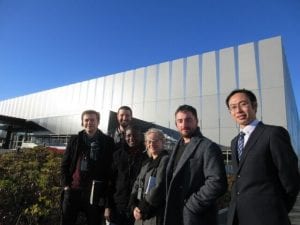Resilience, beauty and delicious food: My impressions of Fukushima, Japan
By By Guest Blogger, on 23 March 2018
I had to double take – tucked away near the bottom of the weekly UCL Student Union newsletter was a call for applicants for a funded week-long trip to Japan, to research and engage with the community recovering from the 2011 tsunami in Fukushima.
I’d visited Japan twice before several years ago as a tourist, and I couldn’t believe my luck that here was an opportunity to visit again in a more, shall we say, ‘useful’ capacity, and help strengthen the already significant ties between UCL and Japan.
After a quick interview in December 2017, I was delighted to be selected by the UCL Global Engagement Office and Professor Shin-Ichi Ohnuma, a native of Fukushima, who would act as our group leader. Less than a month later, I was on a plane bound for Tokyo – funny things can happen when you actually read your emails!
Intensely sobering
Reaching Haneda airport just outside the city, I joined other Masters and PhD students from the UCL Institute for Risk and Disaster Reduction, as well as students from the UCL Academy. We met a government official from the Fukushima prefectural government, who accompanied us on the four-hour coach trip to the prefecture.
He explained that during the week we would be visiting areas of the Fukushima coastline most severely affected by the 2011 tsunami, and other regions the Fukushima Tourism Association believed would interest international tourists.
We embraced every aspect of the trip – from the relaxing ‘onsen’ (traditional Japanese spa) to the delicious food and drink including ramen, tempura and sake.
 This was my third visit to Japan and I have a decent grasp of the language, but I had only a limited knowledge of Fukushima beyond the media headlines that I had read back in 2011 when the world learned about the deadly tsunami.
This was my third visit to Japan and I have a decent grasp of the language, but I had only a limited knowledge of Fukushima beyond the media headlines that I had read back in 2011 when the world learned about the deadly tsunami.
Affected by a ‘triple disaster’, Fukushima was struck on 11 March 2011 by an earthquake, the resulting tidal wave, and an explosion on the site of the Fukushima Daiichi nuclear reactor.
Seven years have passed since the disaster, but I was still unprepared for what I saw. Pictures and videos in the media cannot do justice to the scale of the impact that day had, especially on the local residents. Moving through the evacuated areas was intensely sobering.
All around us, buildings had been ripped apart by the strength of the earthquake. In a town where the evacuation order is yet to be lifted, I saw through a house with the walls ripped off – you could still see a shelving unit in the hall with the family’s shoes on it, unchanged from seven years ago when they were forced to evacuate.
Environmental and social challenges
On the trip we learned about the environmental and social challenges the people of Fukushima are facing, such as the underpopulated and abandoned areas of formerly thriving towns. Since then, thorough decontamination efforts have taken place to open the roads back up to the public, and strict food monitoring policies have been introduced to address the unfounded rumours of Fukushima’s produce remaining tainted by the nuclear fallout. 
On the penultimate day, having worked until sunrise the night before to have it ready, I gave a speech in both English and Japanese to local businessmen, press, and government officials at our leaving reception.
It was so important for me to truly convey how moving each and every person involved in the reconstruction effort’s courage and determination to rebuild their lives was to all of us, and I felt doing so in their own language was the least I could do.
I spoke about how the whole community had inspired us with their strength, kindness and sense of humour. A strong local community is essential to disaster management and revitalisation, and we left with no doubt about the future of Fukushima.
Incredible resilience
Since the disaster, Fukushima has received a lot of international attention, focusing mainly on the problems the region is facing; this attention will only increase now Japan is hosting the Olympics in 2020, and I hope that the international press will start to cover the Fukushima that I witnessed across my five days.
The world should know about the delicious food, the beautiful scenery, and, most of all, the world should learn about the incredible resilience of Fukushima’s people as they respond to the disaster with a courage and vigour that should inspire us all.
Japan is more than just Tokyo; visit Fukushima, the prefecture will surprise you.
 Close
Close


